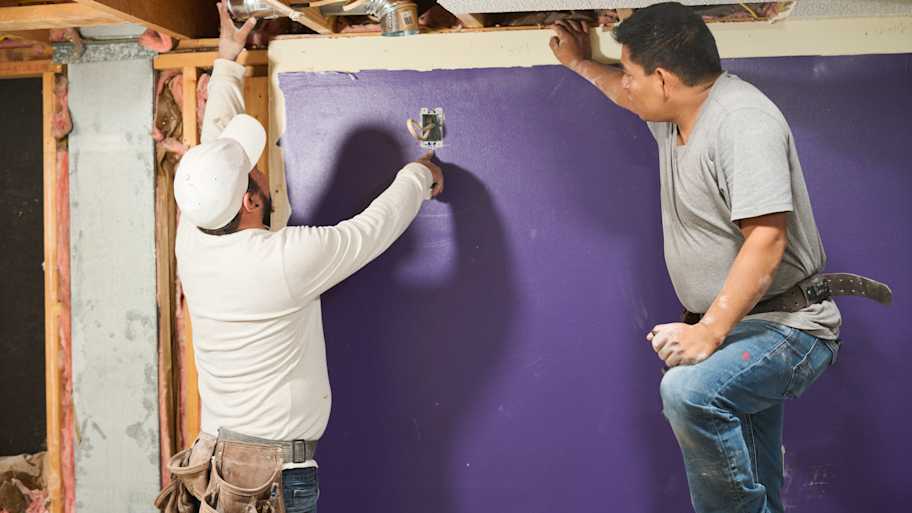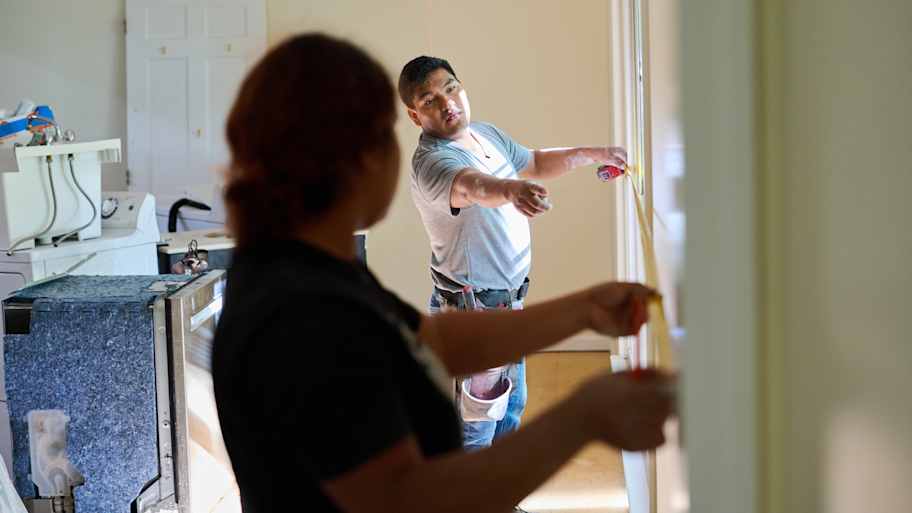Who Patches Drywall After Plumbing or Electrical Work?
Hiring a drywall contractor ensures any messy holes will be seamlessly smoothed over


It isn’t unusual to have some lingering holes in your wall after a plumber fixes a leaky pipe or an electrician does some rewiring. If agreed upfront, these tradespeople might repair the drywall, but, usually, this isn’t their skill. That means you’ll either have to patch the holes yourself—which is tricky if the damage is extensive—or you can hire a professional drywall contractor instead.
A good drywall pro will have the right tools and techniques to make the best job of this labor-intensive, technical task. But don’t just hire the first contractor you contact—especially for significant repairs. You’ll want to check their qualifications and costs to make sure they’re the right person for the job.
How to Find a Drywall Contractor
As well as word-of-mouth recommendations, you can search for local drywall contractors online or through professional bodies like the Association of the Wall and Ceiling Industry. Some reputable painters may also have solid drywall patching experience.
Before Hiring a Drywall Contractor
Before hiring a drywall contractor, you’ll need to assess the extent of the damage, have a rough idea of your budget, and establish if the contractor you hire has the experience and credentials to do good work. The steps below outline the homework you should do to ensure you don’t end up with a botched job.
Drywall work is unlicensed and unregulated just about everywhere, so you need to see the quality of previous work before you invest any money and time in a drywall finishing contractor.
Plan Your Drywall Repair Project for Accurate Quotes
To get accurate quotes, you’ll need to supply the contractor with details of the damage. Measure the size of the holes and note how many there are and where. Patching small holes is possible, but larger ones often need to be cut out and a new piece of drywall inserted in their place. If the holes are in areas that aren’t easily accessible, this may also affect your quotes.
How neatly the holes were cut will also affect the cost to patch them. It’s a whole lot easier to patch a square than it is to patch a messy hole because the contractor has to use more material to fit something misshapen.
Aim to get at least three different quotes from reputable drywall contractors and look for a detailed breakdown of what they cover in their pricing.
Check Your Drywall Contractor’s Qualifications and References

Make sure your drywall contractor or their company has a license. That way, you know they have the right qualifications and years of experience to carry out the work. Also, check that the contractor or company has liability insurance.
Any reputable contractor will be happy to provide references and examples of the quality of their work. Don’t be afraid to follow up on these references and look for online reviews too. If your repairs are extensive, you may want to visit a job they have already completed or at least see photos. You want to see that the repairs they make look good as new.
Questions to Ask Your Drywall Contractor
As well as finding out about your contractor's qualifications, licensing, pricing, and insurance, some other questions to consider asking include:
How long have you been in business?
Will you be doing the work on your own or as part of a team?
Will you be using subcontractors?
When do you propose to start the project?
How long should it take to complete?
How and when should I make payment?
How can I get in touch with you before, during, and after the project?
What clean-up will you do after completing the work?
Do I need to provide any materials?
What will the job involve?
You won’t offend a good contractor asking these questions, so don’t feel awkward about having a prepared list.
Hiring Your Drywall Contractor
Once you have decided on a contractor, you should take a few important steps before the work begins. This includes sorting out a contract, discussing payment plans, and taking photographic records of the walls before any work begins.
Get a Contract and Arrange Payments With Your Drywall Contractor
Having a contract gives you additional peace of mind and a clear outline of what to expect. As well as outlining the total itemized costs and payment structure, it’ll detail what they’re covering as part of the job and the materials they’ll supply. Some contractors may repaint as well as repair the wall, and there could be additional charges for clean-up.
Depending on the extent of the work, you could be looking at drywall repair costs from around $100 to over $1,000. Sometimes you’ll need to make a partial payment before the project begins. For minor repair jobs, usually, payment happens on completion of the project—once you have checked the quality of the work.
Make sure you read all the terms of the contract carefully before any work commences. But for small patch-up jobs, the contract will typically be fairly straightforward.
Keep Records of Your Drywall Repair Project
For small patch-up jobs, the contractor may be in and out quickly. For more extensive repair work, keep a detail of the number of hours they have worked on the job and whether they have stuck to the schedule. This can be helpful should there be any discrepancies or problems during the job or after completion.
After Your Drywall Contractor Has Finished
Make sure you fully inspect the finished job before making the final payment. If there are any reasonable concerns or issues, don’t be afraid to raise these with your contractor.
If you’re happy with the job they have done, why not consider leaving them a review or agreeing to act as a reference. It’s good to support small businesses that do good work and it could help homeowners going through a similar process.





- What Questions Should I Ask Before Hiring a Contractor?
- A Crash Course for Hiring a Contractor
- How to Patch a Hole in Drywall (From Small to Large)
- Top Tips on Hiring the Perfect General Contractor for Your Next Project
- 10 Key Questions to Ask an Interior Painting Contractor Before Hiring Them
- Who Should You Call For Drywall Repairs?
- How to Repair Water-Damaged Drywall
- Who Installs Drywall? Get the Right Pro for the Job
- What to Know Before Hiring a General Contractor to Build a House
- 8 of the Most Common Drywall Problems and How to Solve Them












